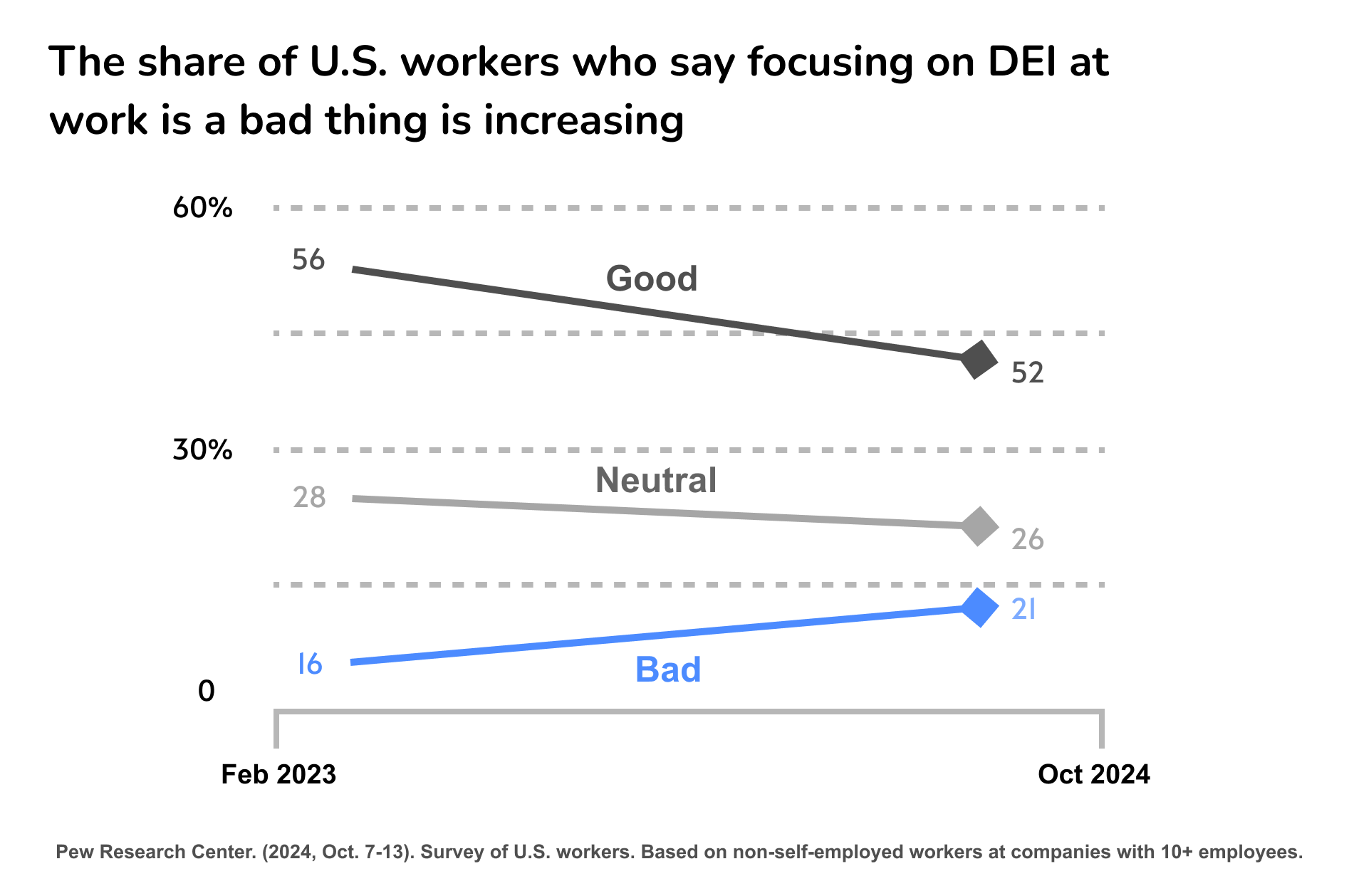The Great DEI Rollback: What's Really Happening
The focus on diversity, equity, and inclusion (DEI) in U.S. businesses is facing its most significant resistance in years. High-profile activists have led campaigns targeting companies for their DEI initiatives, prompting a wave of corporate retrenchment. In recent months, major organizations, including Walmart, Toyota, Boeing, Ford, John Deere, and Lowe's, have scaled back or eliminated DEI programs altogether.
The backlash has gained further traction amid shifting public sentiment and increasing scrutiny of DEI initiatives. As businesses respond to these pressures, many are reevaluating their approaches to diversity and inclusion programs. So is DEI dead? The answer is more nuanced than the headlines suggest.
According to Edison & Black, a leading talent research and recruiting agency, these shifts in perception are reshaping recruitment strategies as organizations recalibrate their approach to building diverse teams.

Recent findings from Pew Research Center show U.S. workers' views on diversity, equity, and inclusion (DEI) efforts are becoming more divided. While 52% still see DEI as a good thing—down from 56% in 2023—the share of those viewing it negatively has risen to 21%.
These findings are derived from two recent surveys: one conducted with U.S. workers in October 2024 and another with U.S. adults in September 2024. Additional insights are from a previous Pew Research Center survey of U.S. workers from February 2023.
Over the past several months, the corporate world has seen a major shift in workplace diversity. Despite facing significant headwinds in today's political and cultural landscape, DEI had grown from a peripheral initiative to a core part of how modern organizations operate. Human Resources professionals remain at the forefront of crafting and implementing policies that ensure workplaces are not only diverse but also inclusive and equitable.
These policies aim to dismantle systemic barriers, foster a culture of belonging, and ultimately enhance organizational performance. As the stewards of corporate culture, HR leaders are tasked with navigating the complex terrain of DEI, balancing the diverse needs of employees with the strategic goals of the organization.
DEI Under Fire: The Current State of Corporate America
In recent years, DEI initiatives took center stage in corporate America, with companies pledging commitments to fostering inclusive workplaces. High-profile diversity programs, equity audits, and targeted recruitment efforts became standard practice among leading firms. Yet, these initiatives have not been without controversy. The push for DEI has met significant backlash, fueled by political, social, and economic factors that question its effectiveness and intent.
Political opposition has framed DEI as divisive, arguing it prioritizes identity politics over meritocracy. Socially, there's contention that DEI initiatives create reverse discrimination, alienating some workplace groups. Economically, critics question the cost-effectiveness of these programs. A notable example is the Society for Human Resource Management (SHRM) dropping "equity" from its core values, sparking widespread debate and serving as a bellwether for broader corporate responses. Companies like Deere & Co. and Tractor Supply Co. have reacted differently: Deere & Co. reaffirmed its commitment to equity, citing business benefits, while Tractor Supply Co. reevaluated its DEI strategies amidst the ongoing debate.
Why DEI Is Facing an Existential Crisis
The DEI landscape is fraught with challenges, not least of which is the mounting public and political backlash. Critics argue that DEI initiatives prioritize identity politics over merit, leading to divisive and polarized workplaces. This sentiment has gained traction, particularly in political circles, where DEI is often portrayed as a threat to traditional values and meritocratic principles.
Adding to the complexity is the confusion and debate over the definition and goals of "equity." While some view equity as essential for leveling the playing field, others see it as a form of reverse discrimination, raising questions about fairness and effectiveness. This lack of consensus hampers the implementation of cohesive DEI strategies and fuels further controversy.
Legal challenges and legislative actions also pose significant hurdles. Several states have introduced bills aimed at restricting DEI programs, arguing that these initiatives violate principles of equality under the law. These legislative efforts create an uncertain environment for businesses trying to navigate the complexities of DEI, forcing them to constantly adapt their strategies to comply with evolving legal standards.
HR's Role: Keeping DEI Alive
In the face of mounting challenges, HR departments play a pivotal role in advocating for and maintaining DEI initiatives within organizations. As the frontline defenders of workplace equality, HR professionals must navigate through the turbulent waters of backlash and criticism with resilience and strategic foresight.
Central to their role is the task of educating and communicating the importance of DEI to stakeholders across the board. This involves not only fostering understanding within the workforce but also engaging with external partners, shareholders, and the broader community. By articulating the business case for diversity and inclusion, HR leaders can garner support and alignment towards sustainable DEI practices.
However, HR's mandate extends beyond advocacy alone. They must also strike a delicate balance between corporate interests and employee well-being. This entails devising policies that promote fairness and equity while safeguarding organizational objectives. By fostering an inclusive culture that values diverse perspectives and experiences, HR can cultivate a workplace where every individual feels valued and empowered to contribute their best. In essence, HR's proactive stance in navigating DEI challenges is instrumental in shaping organizational culture and driving long-term success.
By embracing diversity as a cornerstone of corporate strategy, HR professionals can steer their organizations towards a future where inclusivity isn't just a goal but a defining characteristic of excellence.
Strategic Approaches: Rebranding Without Abandoning the Mission
In promoting diversity within the workplace, HR departments are increasingly pivoting towards emphasizing inclusion and diversity (I&D) rather than focusing on contentious terminology that can polarize opinions. By framing initiatives around I&D, HR leaders aim to create a more cohesive and inclusive environment where all employees feel valued and respected.
Key to this approach is the implementation of inclusive policies that address systemic issues while steering clear of language that may sow division. HR professionals are tasked with designing frameworks that promote fairness and equal opportunity, thereby fostering a workplace culture that celebrates diversity in all its forms.
Moreover, HR plays a crucial role in engaging with both employees and external stakeholders to nurture a culture of inclusion. This involves facilitating open dialogues, listening to diverse perspectives, and integrating feedback into actionable strategies. By actively involving stakeholders in the DEI journey, HR can build consensus and commitment towards shared goals of equity and inclusivity. By adopting these strategic approaches, HR not only strengthens organizational resilience against external pressures but also cultivates a workplace where diversity thrives as a source of innovation and competitive advantage.
Through proactive leadership and inclusive practices, HR professionals can chart a path towards a future where diversity isn't just acknowledged but embraced as a fundamental pillar of organizational success.
The Language Shift: Why Companies Are Dropping the "E"
In response to backlash from conservative activists, many executives report that their companies have altered the language used to describe their diversity, equity, and inclusion (DEI) initiatives, often shifting away from explicit references to racial diversity.
As reported by Bloomberg, a recent survey by the Conference Board, which included responses from over 60 executives, revealed that just over half have adjusted their DEI terminology, with another 20% considering similar changes. Andrew Jones, senior researcher at the Conference Board's ESG Center and co-author of the report, noted that "equity" is often the first term removed, as it tends to attract the most criticism.
Jones explains that companies are "trying to minimize the exposure to scrutiny" and to stem legal risks, and negative headlines. He adds that many firms are now opting to avoid explicit mentions of specific demographic groups, particularly race.
Since 2020, corporate America has significantly expanded DEI initiatives, particularly following the death of George Floyd, which spurred increased advocacy for minority opportunities. However, some conservative groups have claimed that DEI policies, including hiring targets and training, can unfairly disadvantage White employees. In light of this pressure, companies like Toyota and Ford have modified their DEI approaches in an effort to balance inclusivity with minimizing backlash.
So Is DEI Actually Dead?
The short answer: no, but it's transforming. The stakes have never been higher. Companies that abandon DEI entirely risk reputational damage and impacts on employee morale and productivity. Conversely, those that thoughtfully evolve their approach can still see increased innovation and financial performance. HR's role is crucial in ensuring DEI remains a core aspect of organizational culture—even if it goes by a different name.
In navigating these diverse challenges, recruiting agencies like Edison & Black have observed varying client perspectives on DEI, influencing tailored recruitment strategies and expert consultancy to support companies on their journey towards inclusivity. This nuanced understanding underscores the pivotal role of HR in shaping inclusive workplaces that thrive on diversity as a pillar of organizational success.
What Comes Next: The Future of Workplace Diversity
As the landscape of workplace diversity continues to evolve, DEI initiatives are poised to adapt in response to ongoing challenges. The future of DEI is likely to be characterized by a shift towards more nuanced and effective strategies that transcend conventional frameworks. This evolution will be driven by a growing recognition of the need for inclusivity that genuinely resonates with all employees, moving beyond performative measures to foster real, lasting change.
Innovative strategies will play a critical role in maintaining and promoting workplace diversity. Organizations are increasingly exploring technology-driven solutions, such as AI-driven analytics to assess and address biases in hiring and promotion processes. Additionally, virtual reality (VR) and augmented reality (AR) are being leveraged to create immersive training experiences that enhance empathy and understanding among employees, bridging gaps in cultural competence and inclusivity.
HR's role in shaping the future of inclusive workplaces will be more pivotal than ever. As champions of diversity, HR professionals are expected to be at the forefront of designing and implementing cutting-edge DEI programs that are both impactful and sustainable. This includes advocating for policies that support work-life balance, mental health, and career development opportunities for underrepresented groups, ensuring that inclusivity is woven into the very fabric of organizational culture.
Furthermore, HR will need to harness data-driven insights to continually refine DEI strategies, ensuring they remain relevant and effective in a rapidly changing world. By fostering a culture of continuous learning and adaptation, HR can empower organizations to not only meet current diversity benchmarks but also set new standards for inclusion and equity in the workplace.
Through proactive leadership and innovative thinking, HR professionals will be instrumental in building workplaces where diversity is not just an objective but a defining characteristic of organizational success. DEI may be wounded, but it's far from dead.
